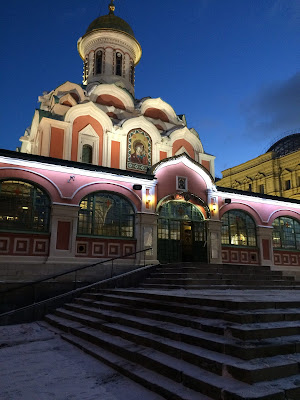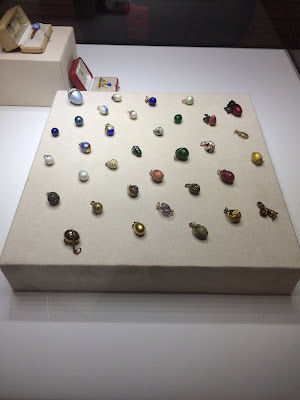"But we have learned once and for all
That blood only smells like blood."
--
Anna Akhmatova,
The Scent of Freedom (1933)
100 years ago today, the Russian Revolution took place. It is worth remembering and commemorating, I believe, since it changed the course of so many events--and impacted so many lives. The Russian Revolution set the backdrop for so much of the 20th century--the struggles, the fears, the politics, the idealism, the demagoguery, and the blood.
It is easy to get swept up in the ideals of the Russian Revolution. Peace, land, and bread. A world of peace and love and true brotherhood and sisterhood, where people actually look out for each other and everything is shared in common. Who wouldn't want to be a part of that world, especially after seeing so much decadence and incompetence exemplified by the tsars? It sounds too good to be true. Truth be told, if I had grown up during the 1920s in the Soviet Union, I probably would have been a devout Party member, a good member of the Komsomol, with a cushy secretarial job in Moscow.
And then I probably would have been purged along with millions of other people in the 1930s.
For along with the ideals of the Russian Revolution, there is also the bitter reality that millions of people suffered for those ideals--and not only for those ideals, but suffered so that a few men could stay on top and control how those ideals were understood and implemented.
Reality is always so much messier (and bloodier) than ideals. And although I don't pretend to really know or truly understand what the Russian Revolution has meant to millions of people, I have brushed shoulders with the Russian Revolution, because I have brushed shoulders with people who were directly impacted by it. I have broken bread with women who wished with all of their hearts that the days of communism and Soviet butter were back. I have walked past a towering (and now-overthrown) statue of Lenin in Kharkov's main square. I have met people who survived, and met others whose family members died, in the Stalin purges and famines of the 1930s. I have seen the mementos of the Soviet era--the old men selling Soviet kitsch on the sidewalk, the plaques commemorating revolution.
These lived experiences and memories are part of the legacy of the Russian Revolution, too.
When I took a Soviet History course during my undergraduate years, we read a book called
Journey Into the Whirlwind, a memoir by Yevgenia Ginzburg. Ginzburg was a staunch Communist who was arrested and sent to the gulag during the Stalinist purges of the 1930s. Her memoirs document the banality, horror, and learned normalcy of her hellish life in the gulag system. One of the overarching themes of her memoir is her struggle to come to terms with her arrest. Since she was a staunch Communist, she couldn't bring herself to believe that her arrest had to do with some fault of the system--rather, it
had to be with her, didn't it? But how could it? She was a good Party member, so it
couldn't be her. Her arrest must be because of someone else. But not because of Stalin. And certainly not because of the Party. They just didn't
know who she truly was and how committed she was to the cause.
But as her memoir continues, she starts to realize that she--just like everyone else--is to blame for the madness, blood, and destruction associated with the communist regime. She struggles with her complicity:
"In each heart a mea culpa beats, and those two words resonate in the deepest part of our souls. During sleepless nights they are heard very clearly. Those sleepless nights in which, as Pushkin says, we all 'reread life with horror', and we shudder, and curse.
"When you can't sleep, the knowledge that you did not directly take part in the murders and betrayals is no consolation. After all, the assassin is not only he who struck the blow, but whoever supported evil, no matter how: by thoughtless repetition of dangerous political theories, by silently raising his right hand, by faint-heartedly writing half-truths. Mea culpa . . . and it occurs to me more and more frequently that even eighteen years of hell on earth is insufficient expiation for the guilt" (Within the Whirlwind).
It is easy to get swept up in ideals. It is easy to think that what you believe is right and that no one else can be right. It is easy to think your system is right and shift blame onto someone else or some other system or some other way of thinking. But, ultimately, we are all at fault for something.
Mea culpa. In some way, it is our fault. And I think that is a lesson of the Russian Revolution.
[Section of Reynier Leyva Novo's Five Nights, an art display representing works like Mein Kampf and other authoritarian tracts which provided the foundation for so much suffering in the 20th century. This one represent's Vladimir Lenin's The State and Revolution.]
A while ago I was talking to a friend in Ukraine. We were talking about the state of the world, and at one point he simply said: "
Mir--eta my." The world is us. The world is made up of
us. We do have the responsibility of recognizing our culpability and choosing to do something about that.
Good and evil is not as simple as party lines or class. As Solzhenitsyn wrote, "If only there were evil people somewhere insidiously committing evil deeds, and it were necessary only to separate them from the rest of us and destroy them. But the line dividing good and evil cuts through the heart of every human being. And who is willing to destroy a piece of his own heart?"
Who, indeed.


















































